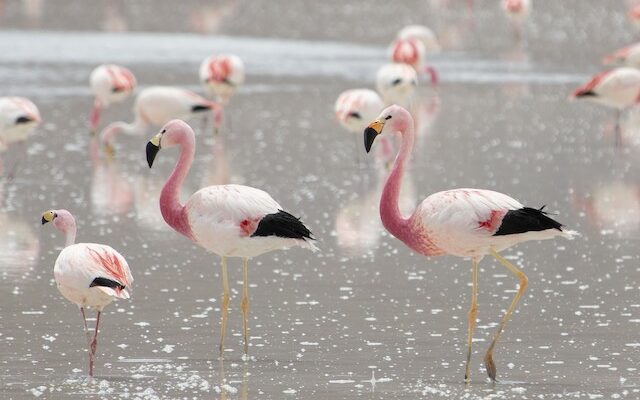Concerns regarding the quarrying of lithium-ion battery materials are well known, but in Chile the mining of lithium may be negatively influencing flamingo populations, according to a new study.
The study looked at the effects of lithium mining and climate change on five shallow, saltwater lakes in the Chilean Andes Mountains where flamingos flock for feeding and breeding.
The results show that two species of flamingos that breed only in these mountains have lost 10-12% of their populations in the past 11 years.
Lakes across the region have shrunk, but the scientists found flamingo numbers had only begun to decline at Salar de Atacama, where Chile’s 9.6 million tons of identified lithium mining resources is largely focused.
The study was published in the biological research journal Proceedings of the Royal Society B.
The region is home to three species of flamingos— Andean, James’, and Chilean— two of which breed nowhere else in the world and form the foundation of the region’s ecotourism industry.
Dr. Nathan Senner, a population biologist at the University of South Carolina, US, and co-author on the paper, said: “Given how rapidly our demand for lithium is growing, there is a great need to understand what negative effects its production might be having on biodiversity and especially those species, like flamingos, that are important to local economies.”
The study included scientists in Spain, Montana, and Chile; it focused on five lakes in the Chilean Andes, including the Salar de Atacama.
The authors relied on 30 years of flamingo counts collected by citizen scientists and biologists from the Chilean government across the five saline lakes.
They also used remote sensing data to identify changes in water levels and food availability within each lake across time.
South America’s Lithium Triangle
Around 58% of the world’s lithium is mined in the ‘Lithium Triangle’ of Chile, Bolivia, and Argentina, according to January 2021 data from the U.S. Geological Survey.
The majority of lithium is mined by an oligopoly of producers: Albermarle, private Sociedad Quimica y Minera de Chile (SQM), and FMC Corp.
Dr. Jorge Gutiérrez, an ecologist at the Universidad de Extremadura in Spain who led the study, said: “The problem is that in the Salar de Atacama, in addition to the changes caused by climate change across the region, lithium mining is reducing water levels and increasing disturbances for flamingos.
“This means years with sufficient water for flamingos to breed occur less frequently and fewer flamingos are now present, even when there is enough water.”
Every ton of lithium extracted requires an estimated 500,000 gallons of water, leading to mining activities consuming 65% of the Atacama’s water supply, according to 2020 Harvard International Review.
SQM says the number is much lower, with 5,944 gallons of fresh water required per metric ton of lithium carbonate produced.
Lithium production in Chile is projected to expand to other saline lakes beyond the Salar de Atacama.
Dr. Cristina Dorador, a co-author and professor at the Universidad de Antofagasta, Chile, said: “The flamingo declines we documented in the Salar de Atacama may soon spread to the rest of the region.
“Given that two of these flamingo species breed nowhere else in the world, this could lead to dramatic declines across their entire range and severely hurt the local ecotourism industry that relies on flamingos.”












